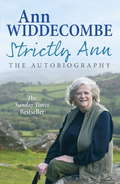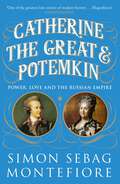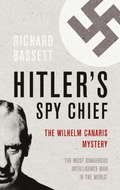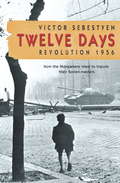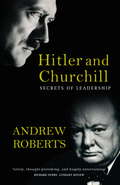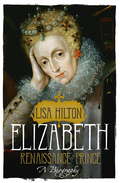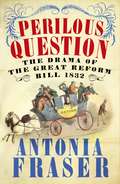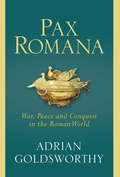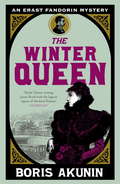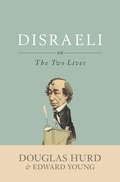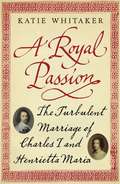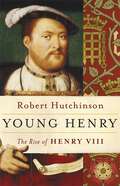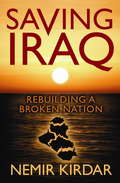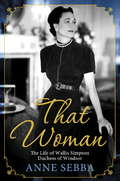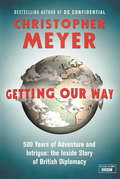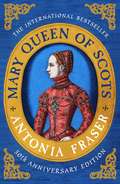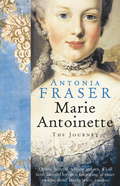- Table View
- List View
Strictly Ann: The Autobiography
by Ann WiddecombeForthright memoirs of a singular personality - former MP and Strictly Come Dancing star, Ann Widdecombe.In this life story of one of our most outspoken and celebrated politicians, Ann Widdecombe offers a unique insight into her time as a minister in three government departments and the Shadow Cabinet in the 1990s, as well as taking us back to her wandering childhood and explaining the roots of her deeply held views.A rare anti-hunting Tory, who campaigned for prison education and once donned a miner's overalls to go down a coal mine, Ann Widdecombe has never shied away from controversy. Her memoirs reveal a singular personality who lives life to the full. From feisty appearances on Have I Got News for You to her unforgettable and star-turning performances on Strictly Come Dancing, Ann has earned her place in the public's affections and has been heralded as a 'national living treasure' by the Guardian.
Catherine the Great and Potemkin: The Imperial Love Affair
by Simon Sebag Montefiore'One of the great love stories of history, in a league with Napoleon and Josephine, and Antony and Cleopatra ... Excellent, with dazzling mastery of detail and literary flair' EconomistIt was history's most successful political partnership - as sensual and fiery as it was creative and visionary. Catherine the Great was a woman of notorious passion and imperial ambition. Prince Potemkin - wildly flamboyant and sublimely talented - was the love of her life and her co-ruler.Together they seized Ukraine and Crimea, defining the Russian empire to this day. Their affair was so tumultuous that they negotiated an arrangement to share power, leaving Potemkin free to love his beautiful nieces, and Catherine her young male favourites. But these 'twin souls' never stopped loving each other.Drawing on their intimate letters and vast research, Simon Sebag Montefiore's enthralling, widely acclaimed biography restores these imperial partners to their rightful place as titans of their age.
Catherine the Great and Potemkin: The Imperial Love Affair
by Simon Sebag Montefiore'One of the great love stories of history, in a league with Napoleon and Josephine, and Antony and Cleopatra ... Excellent, with dazzling mastery of detail and literary flair' EconomistIt was history's most successful political partnership - as sensual and fiery as it was creative and visionary. Catherine the Great was a woman of notorious passion and imperial ambition. Prince Potemkin - wildly flamboyant and sublimely talented - was the love of her life and her co-ruler.Together they seized Ukraine and Crimea, defining the Russian empire to this day. Their affair was so tumultuous that they negotiated an arrangement to share power, leaving Potemkin free to love his beautiful nieces, and Catherine her young male favourites. But these 'twin souls' never stopped loving each other.Drawing on their intimate letters and vast research, Simon Sebag Montefiore's enthralling, widely acclaimed biography restores these imperial partners to their rightful place as titans of their age.
Hitler's Spy Chief: The Wilhelm Canaris Mystery
by Richard BassettHow Hitler's spy chief sabotaged the German war effort.Wilhelm Canaris was appointed by Hitler to head the Abwehr (the German secret service) 18 months after the Nazis came to power. But Canaris turned against the Fuhrer and the Nazi regime, believing that Hitler would start a war Germany could not win. In 1938 he was involved in an attempted coup, undermined by British Prime Minister Neville Chamberlain. In 1940 he sabotaged the German plan to invade England, and fed General Franco vital information that helped him keep Spain out of the war. For years he played a dangerous double game, desperately trying to keep one step ahead of the Gestapo. The SS chief, Heinrich Himmler, became suspicious of the Abwehr and by 1944, when Abwehr personnel were involved in the attempted assassination of Hitler, he had the evidence to arrest Canaris himself. Canaris was executed a few weeks before the end of the war.
Hitler's Spy Chief: The Wilhelm Canaris Mystery
by Richard BassettHow Hitler's spy chief sabotaged the German war effort.Wilhelm Canaris was appointed by Hitler to head the Abwehr (the German secret service) 18 months after the Nazis came to power. But Canaris turned against the Fuhrer and the Nazi regime, believing that Hitler would start a war Germany could not win. In 1938 he was involved in an attempted coup, undermined by British Prime Minister Neville Chamberlain. In 1940 he sabotaged the German plan to invade England, and fed General Franco vital information that helped him keep Spain out of the war. For years he played a dangerous double game, desperately trying to keep one step ahead of the Gestapo. The SS chief, Heinrich Himmler, became suspicious of the Abwehr and by 1944, when Abwehr personnel were involved in the attempted assassination of Hitler, he had the evidence to arrest Canaris himself. Canaris was executed a few weeks before the end of the war.
Twelve Days: Revolution 1956. How the Hungarians tried to topple their Soviet masters
by Victor SebestyenThe defining moment of the Cold War: 'The beginning of the end of the Soviet empire.' (Richard Nixon)The Hungarian Revolution in 1956 is a story of extraordinary bravery in a fight for freedom, and of ruthless cruelty in suppressing a popular dream. A small nation, its people armed with a few rifles and petrol bombs, had the will and courage to rise up against one of the world's superpowers. The determination of the Hungarians to resist the Russians astonished the West. People of all kinds, throughout the free world, became involved in the cause. For 12 days it looked, miraculously, as though the Soviets might be humbled. Then reality hit back. The Hungarians were brutally crushed. Their capital was devastated, thousands of people were killed and their country was occupied for a further three decades.The uprising was the defining moment of the Cold War: the USSR showed that it was determined to hold on to its European empire, but it would never do so without resistance. From the Prague Spring to Lech Walesa's Solidarity and the fall of the Berlin Wall, the tighter the grip of the communist bloc, the more irresistible the popular demand for freedom.
Hitler and Churchill: Secrets of Leadership
by Andrew Roberts'His book is timely and a triumph. Roberts manages to convey all the reader needs to know about two men to whom battalions of biographies have been devoted' EVENING STANDARDAdolf Hitler and Winston Churchill were two totally opposite leaders - both in what they stood for and in the way in which they seemed to lead. Award-winning historian Andrew Roberts examines their different styles of leadership and draws parallels with rulers from other eras. He also looks at the way Hitler and Churchill estimated each other as leaders, and how it affected the outcome of the war. In a world that is as dependent on leadership as any earlier age, HITLER AND CHURCHILL asks searching questions about our need to be led. In doing so, Andrew Roberts forces us to re-examine the way that we look at those who take decisions for us.
Elizabeth: Renaissance Prince
by Lisa HiltonA definitive portrait of one of the most compelling monarchs England has ever had: Elizabeth I.'We are a prince from a line of princes.'Lisa Hilton's majestic biography of Elizabeth I, 'The Virgin Queen', uses new research to present a fresh interpretation of Elizabeth as a queen who saw herself primarily as a Renaissance prince, delivering a very different perspective on her emotional and sexual life, and upon her attempts to mould England into a European state. Elizabeth was not an exceptional woman but an exceptional ruler, and this book challenges readers to reassess her reign, and the colourful drama, scandal and intrigue to which it is always linked.
Elizabeth: Renaissance Prince
by Lisa HiltonA definitive portrait of one of the most compelling monarchs England has ever had: Elizabeth I.'We are a prince from a line of princes.'Lisa Hilton's majestic biography of Elizabeth I, 'The Virgin Queen', uses new research to present a fresh interpretation of Elizabeth as a queen who saw herself primarily as a Renaissance prince, delivering a very different perspective on her emotional and sexual life, and upon her attempts to mould England into a European state. Elizabeth was not an exceptional woman but an exceptional ruler, and this book challenges readers to reassess her reign, and the colourful drama, scandal and intrigue to which it is always linked.
Perilous Question: The Drama of the Great Reform Bill 1832
by Lady Antonia FraserThe two-year revolution that totally changed how Britain is governed.Internationally bestselling historian Antonia Fraser's new book brilliantly evokes one year of pre-Victorian political and social history - the passing of the Great Reform Bill of 1832, an eventful and violent year that featured riots in Bristol, Manchester and Nottingham.The time-span of the book is from Wellington's intractable declaration in November 1830 that 'The beginning of reform is beginning of revolution' to 7 June 1832, when William IV reluctantly assented to the Great Reform Bill, under the double threat of the creation of 60 new peers in the House of Lords and the threat of revolution throughout the country. Wider themes of Irish and 'negro emancipation' underscore the narrative.The book is character driven; we learn of the Whig aristocrats prepared to whittle away their own power to bring liberty to the country, the all-too-conservative opposition who included the intransigent Duchess of Kent and Queen Adelaide and finally the 'revolutionaries' like William Cobbett, author of Rural Rides.These events led to a total change in the way Britain was governed, a two-year revolution that Antonia Fraser brings to vivid dramatic life.
Pax Romana: War, Peace and Conquest in the Roman World
by Adrian Goldsworthy Dr Adrian Goldsworthy LtdThe Pax Romana is famous for having provided a remarkable period of peace and stability, rarely seen before or since. Yet the Romans were first and foremost conquerors, imperialists who took by force a vast empire stretching from the Euphrates in the east to the Atlantic coast in the west. Their peace meant Roman victory and was brought about by strength and dominance rather than co-existence with neighbours. The Romans were aggressive and ruthless, and during the creation of their empire millions died or were enslaved.But the Pax Romana was real, not merely the boast of emperors, and some of the regions in the Empire have never again lived for so many generations free from major wars. So what exactly was the Pax Romana and what did it mean for the people who found themselves brought under Roman rule?Acclaimed historian Adrian Goldsworthy tells the story of the creation of the Empire, revealing how and why the Romans came to control so much of the world and asking whether the favourable image of the Roman peace is a true one. He chronicles the many rebellions by the conquered, and describes why these broke out and why most failed. At the same time, he explains that hostility was only one reaction to the arrival of Rome, and from the start there was alliance, collaboration and even enthusiasm for joining the invaders, all of which increased as resistance movements faded away.A ground-breaking and comprehensive history of the Roman Peace, Pax Romana takes the reader on a journey from the bloody conquests of an aggressive Republic through the age of Caesar and Augustus to the golden age of peace and prosperity under diligent emperors like Marcus Aurelius, offering a balanced and nuanced reappraisal of life in the Roman Empire.
Pax Romana: War, Peace and Conquest in the Roman World
by Adrian GoldsworthyThe Pax Romana is famous for having provided a remarkable period of peace and stability, rarely seen before or since. Yet the Romans were first and foremost conquerors, imperialists who took by force a vast empire stretching from the Euphrates in the east to the Atlantic coast in the west. Their peace meant Roman victory and was brought about by strength and dominance rather than co-existence with neighbours. The Romans were aggressive and ruthless, and during the creation of their empire millions died or were enslaved.But the Pax Romana was real, not merely the boast of emperors, and some of the regions in the Empire have never again lived for so many generations free from major wars. So what exactly was the Pax Romana and what did it mean for the people who found themselves brought under Roman rule?Acclaimed historian Adrian Goldsworthy tells the story of the creation of the Empire, revealing how and why the Romans came to control so much of the world and asking whether the favourable image of the Roman peace is a true one. He chronicles the many rebellions by the conquered, and describes why these broke out and why most failed. At the same time, he explains that hostility was only one reaction to the arrival of Rome, and from the start there was alliance, collaboration and even enthusiasm for joining the invaders, all of which increased as resistance movements faded away.A ground-breaking and comprehensive history of the Roman Peace, Pax Romana takes the reader on a journey from the bloody conquests of an aggressive Republic through the age of Caesar and Augustus to the golden age of peace and prosperity under diligent emperors like Marcus Aurelius, offering a balanced and nuanced reappraisal of life in the Roman Empire.
The Winter Queen: An Erast Fandorin Mystery 1 (Erast Fandorin Mysteries #3)
by Boris AkuninTHE FIRST BOOK IN THE MULTI-MILLION COPY, INTERNATIONALLY BESTSELLING ERAST FANDORIN MYSTERIES SERIES'A sparkling romp of a story' TLS'In Russia Boris Akunin is roughly the counterpart of John Grisham' TIME'Think Tolstoy writing James Bond with the logical rigour of Sherlock Holmes' GUARDIANMoscow 1876. A young law student commits suicide in broad daylight in Moscow's Alexander Gardens. But this is no ordinary death, for the young man was the son of an influential industrialist and has left a considerable fortune.Erast Fandorin, a hotheaded new recruit to the Criminal Investigation Department, is assigned to the case. Brilliant, young, and sophisticated, Fandorin embarks on an investigation that will take him from the palatial mansions of Moscow to the seedy backstreets of London in his hunt for the conspirators behind this mysterious death.What readers are saying about the Erast Fandorin Mysteries:'I loved it... I just couldn't put it down!' My book Obsession'A delightful mystery/adventure! There's a dark twist at the end that has me anxious to continue in this series' Neil on Goodreads (five stars)'Ultimately, the overall success of The Winter Queen is due to the vibrancy of its setting, the cleanness of its prose and the magnetism of its protagonist... Odds seem good that Akunin will be the next detective to capture readers' fancy en masse' Sarah Weinman, January Magazine 'These books are a fun, riotous read that you don't want to put down until you've completed each and every one of them' Jill on Goodreads (five stars)'The conclusion is shocking and this reader can't wait to delve into the next in the series' A Writer's Jumble'Nail-biter all the way through!' Corin on Goodreads (five stars)A page-turning delight perfect for fans of Sherlock Holmes, Hercule Poirot and the Russian literary greats.
Disraeli: or, The Two Lives
by Edward Young Douglas HurdBenjamin Disraeli was the most gifted parliamentarian of the nineteenth century and a superb orator, writer and wit - but how much do we really know about the man behind the words?'As Douglas Hurd and Edward Young point out in their splendidly written, finely judged and thoroughly persuasive book, a vast chasm yawned between the real Disraeli and his posthumous reinvention' Dominic Sandbrook, SUNDAY TIMES'Not only, they tell us in this vigorously debunking romp through his political life, did he never use the phrases "One Nation" or "Tory Democracy", he was actively hostile to the concepts that they are now understood to represent' Sam Leith, THE SPECTATOR'The book is more a study in character . . . than a staid political narrative. As a result, Disraeli: Or the Two Lives is full of unexpected jolts and paradoxes . . . It proves an unflagging pleasure to read' Richard Davenport-Hines, GUARDIAN'So intoxicating that you will find yourself snorting it up in one go, as I did, with great pleasure' Boris Johnson, MAIL ON SUNDAY
Disraeli: or, The Two Lives
by Edward Young Douglas HurdBenjamin Disraeli was the most gifted parliamentarian of the nineteenth century and a superb orator, writer and wit - but how much do we really know about the man behind the words?'As Douglas Hurd and Edward Young point out in their splendidly written, finely judged and thoroughly persuasive book, a vast chasm yawned between the real Disraeli and his posthumous reinvention' Dominic Sandbrook, SUNDAY TIMES'Not only, they tell us in this vigorously debunking romp through his political life, did he never use the phrases "One Nation" or "Tory Democracy", he was actively hostile to the concepts that they are now understood to represent' Sam Leith, THE SPECTATOR'The book is more a study in character . . . than a staid political narrative. As a result, Disraeli: Or the Two Lives is full of unexpected jolts and paradoxes . . . It proves an unflagging pleasure to read' Richard Davenport-Hines, GUARDIAN'So intoxicating that you will find yourself snorting it up in one go, as I did, with great pleasure' Boris Johnson, MAIL ON SUNDAY
A Royal Passion: The Turbulent Marriage of Charles I and Henrietta Maria
by Dr Katie WhitakerFrom quarrels, passion, treason to execution, discover one of the great overlooked love stories of history.King Charles I was a Protestant. Henrietta Maria, a 15-year-old French princess, was a Catholic. Arranged for political gain, their marriage was a dangerous experiment, yet against the odds they fell in love. However Henrietta's Catholicism fuelled rumours of improper influence over a supposedly helpless king. Unable to trust his Parliament, Charles's fear for the queen's safety plummeted the country into civil war and forced her to flee abroad, never to see her husband again. They kept up a poignant correspondence but in 1649, the king was condemned as a traitor and publicly executed, thus ending an extraordinary partnership that influenced the course of history.'Bright, subtle and astute'The Spectator'In her lively portrait of the ill-fated marriage of Charles I and Henrietta Maria, Katie Whitaker has brought their tragedy and the English Civil War vividly to life'David Starkey
Young Henry: The Rise of Henry VIII
by Robert HutchinsonCompelling account of the first 35 years of a magnificent and ruthless monarch.Henry became the unexpected heir to the precarious Tudor throne in 1502, after his elder brother Arthur died. He also inherited both his brother's wardrobe and his wife, the Spanish princess Katherine of Aragon. He became king in April 1509 with many personality traits inherited from his father - the love of magnificence, the rituals of kingship, the excitement of hunting and gambling and the construction of grand new palaces. After those early glory days of feasting, fun and frolic, the continuing lack of a male Tudor heir runs like a thin line of poison through Henry's reign. After he fell in love with Anne Boleyn, he gambled everything on her providing him with a son and heir. From that day forward everything changed.Based on contemporary accounts, Young Henry provides a compelling vision of the splendours, intrigues and tragedies of the royal court, presided over by the ruthless and insecure Henry VIII. With his customary scholarship and narrative verve, Robert Hutchinson provides fresh insights into what drove England's most famous monarch, and how this happy, playful Renaissance prince was transformed into the tyrant of his later years.
Saving Iraq: Rebuilding A Broken Nation
by Nemir KirdarNemir Kirdar has lived Iraq's history. From the country of his youth - a stable and vibrant land of great promise, to the 1958 coup that plunged Iraq into a period of terror and destruction, foreign occupation, and the fall of Saddam Hussein, he's been uniquely placed to comment on events and propose solutions.Now Kirdar shares his vision for tomorrow's Iraq, providing a blueprint for political, economic and social renewal. Calling for Iraqis to rise up and unlock their nation's potential, Kirdar affirms that Iraq can again be unified. SAVING IRAQ is a personal account but also a book of global significance, offering steps towards resolution in a shattered country.
Saving Iraq: Rebuilding a Broken Nation
by Nemir KirdarNemir Kirdar has lived Iraq's history. From the country of his youth - a stable and vibrant land of great promise, to the 1958 coup that plunged Iraq into a period of terror and destruction, foreign occupation, and the fall of Saddam Hussein, he's been uniquely placed to comment on events and propose solutions.Now Kirdar shares his vision for tomorrow's Iraq, providing a blueprint for political, economic and social renewal. Calling for Iraqis to rise up and unlock their nation's potential, Kirdar affirms that Iraq can again be unified. SAVING IRAQ is a personal account but also a book of global significance, offering steps towards resolution in a shattered country.
That Woman: The Life of Wallis Simpson, Duchess of Windsor
by Anne SebbaBestselling biography of the enduringly fascinating Wallis SimpsonOne of Britain's most distinguished biographers turns her focus on one of the most vilified women of the twentieth century. Historian Anne Sebba has written the first full biography by a woman of Wallis Simpson, Duchess of Windsor. 'That woman', as she was referred to by the Queen Mother, became a hate figure for ensnaring a British king and destabilising the monarchy. Neither beautiful nor brilliant, she nevertheless became one of the most talked-about women of her generation, and she inspired such deep love and adoration in Edward VIII that he gave up a throne and an empire for her. Wallis lived by her wit and her wits, while both her apparent and alleged moral transgressions added to her aura and dazzle. Based on new archives and material only recently made available, this scrupulously researched biography sheds new light on the character and motivations of a powerful, charismatic and complex woman.
Getting Our Way: 500 Years of Adventure and Intrigue: the Inside Story of British Diplomacy
by Christopher MeyerOver the last five hundred years, Britain's power has waxed and waned: from the puny island nation of the sixteenth century, to the global superpower of the nineteenth century, to the more modest post-imperial status today of a major European power. But in these radically different circumstances, the wisdom of Lord Palmerston's observation has endured.Getting Our Way recounts nine stories from Britain's diplomatic annals over the last five hundred years, in which the diplomats themselves are at the centre of the narrative. It is an inside account of their extraordinary experiences, sometimes in the face of physical danger, often at history's hinge. Be it Henry Killigrew's mission to Edinburgh in 1572, Castlereagh at the Congress of Vienna, Our Man in Washington and the Nassau Deal, or the handover of Hong Kong to China, we can see how Britain has viewed its interests in the world and sought to advance them.Some of these dramatic episodes record triumph, some failure, but all of them illustrate how the three pillars of the national interest - security, prosperity and values - have been the foundation of British foreign policy for half a century. Each story is illuminated by colourful anecdotes and insights drawn from Christopher Meyer's first-hand experience of international relations.Moreover, the book is a salutary reminder that foreign policy (what is to be done) and diplomacy (how it is to be done) begin and end with the national interest. And far from being the preserve of aloof aristocrats, the pursuit of our national interest is replete with intrigue, treachery, espionage, and danger - an extraordinary combination of high principle and low cunning, vice and virtue, all with the specific aim of 'getting our way'.
Getting Our Way: 500 Years of Adventure and Intrigue: the Inside Story of British Diplomacy
by Sir Christopher MeyerA highly informed insider's account of some of the 'honest men' as they sought, by fair means or foul, to get Britain its way in the world.GETTING OUR WAY recounts nine stories from Britain's diplomatic annals over the last five hundred years, in which the diplomats themselves are at the centre of the narrative. It is an inside account of their extraordinary experiences, sometimes in the face of physical danger, often at history's hinge. Be it Henry Killigrew's mission to Edinburgh in 1572, Castlereagh at the Congress of Vienna, Our Man in Washington and the Nassau Deal, or the handover of Hong Kong to China, we can see how Britain has viewed its interests in the world and sought to advance them. Some of these dramatic episodes record triumph, some failure, but all of them illustrate how the three pillars of the national interest - security, prosperity and values - have been the foundation of British foreign policy for half a century. Each story is illuminated by colourful anecdotes and insights drawn from Christopher Meyer's first-hand experience of international relations. Moreover, the book is a salutary reminder that foreign policy and diplomacy begin and end with the national interest. And far from being the preserve of aloof aristocrats, the pursuit of our national interest is replete with an extraordinary combination of high principle and low cunning, vice and virtue, all with the specific aim of 'getting our way'.
Mary Queen Of Scots
by Antonia Fraser'Ground-breaking ... One of the greatest international bestsellers of the post-war period' Andrew Roberts, Daily Telegraph'Reads like an engrossing novel' Sunday TimesAn infant queen. A teenage widow. Beautiful, flamboyant Mary Queen of Scots had a formidable intellect but her political sense - formed at the absolute court of France - plunged her country into a maelstrom of intrigue, marriage and murder. Upon fleeing to England she was held captive by her cousin Elizabeth I. In this classic biography, reissued for the fiftieth anniversary of its publication, acclaimed historian Antonia Fraser relates the enthralling story of Mary's life and untimely end.
Mary Queen of Scots
by Antonia FraserMary Queen of Scots passed her childhood in France and married the Dauphin to become Queen of France at the age of sixteen. Widowed less than two years later, she returned to Scotland as Queen after an absence of thirteen years.
Marie Antoinette: The Journey
by Lady Antonia Fraser'Drama, betrayal, religion and sex, it's all here ... Fascinating' GUARDIAN'Beautifully paced, impeccably written ... Don't miss it' INDEPENDENT'Fraser is at her best here, lucid, authoritative and compassionate' SUNDAY TIMES 'Superbly researched ... the definitive work on the ill-fated queen' CATHOLIC HERALDMarie Antoinette's dramatic life-story continues to arouse mixed emotions. To many people, she is still 'la reine méchante', whose extravagance and frivolity helped to bring down the French monarchy; her indifference to popular suffering epitomised by the (apocryphal) words: 'let them eat cake'. Others are equally passionate in her defence: to them, she is a victim of misogyny.Antonia Fraser examines her influence over the king, Louis XVI, the accusations and sexual slurs made against her, her patronage of the arts which enhanced French cultural life, her imprisonment, the death threats made against her, rumours of lesbian affairs, her trial (during which her young son was forced to testify to sexual abuse by his mother) and her eventual execution by guillotine in 1793.
